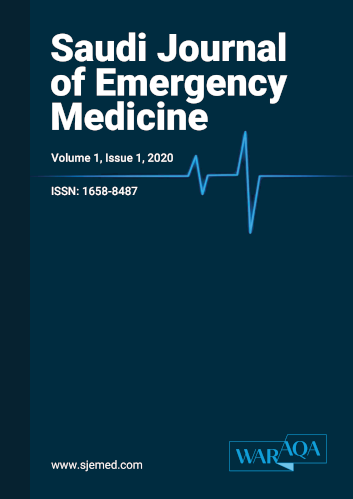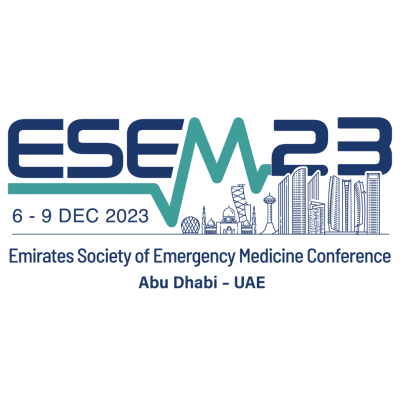Saud Ali Algaribi, Lutfiah Abdulaziz Qawwas, Bandar Al mufareh, Ali Hassan Aldehaim, Mohammed. Al jumaan, Maumon Mahmud, Kharsan Mohammed Almakhalas
Year: 2021 |
Volume: 2 |
Issue: 1 |
Pages: 54 - 59
Faisal Alhusain, Maryam Aloqalaa, Danah Alrusayyis, Khalid Alshehri, Sadaqah Wazzan, Nouf Alwelyee, Aljerian Nawfal
Year: 2020 |
Volume: 1 |
Issue: 1 |
Pages: 5 - 14
Mobarak Al Mulhim
Year: 2020 |
Volume: 1 |
Issue: 1 |
Pages: 32 - 32
Shahad Aldelaijan, Mona Alsanae, Maysan almegbel, Nouf Alsadoun, Shahad Altoyan, Wasmiyah Alshammari, Areej Madani, Zainab Alhussaini, Alaa Althubaiti, Nawfal Aljerian
Year: 2020 |
Volume: 1 |
Issue: 1 |
Pages: 15 - 19
Bashar Elwir, Patrick Ukwade, Ayesha Almemari
Year: 2020 |
Volume: 1 |
Issue: 1 |
Pages: 20 - 24
Maha Baabdullah, Hamsah Faden, Rawan Alsubhi, Ahmed Almalki, Basim Masri, Abdullah Alharbi
Year: 2020 |
Volume: 1 |
Issue: 2 |
Pages: 110 - 120
Albraa F. Shodari, Majdah A. Almaghrabi, Sarah A. Basindwah, Banan F. Alhazmi, Salah M. Fallatah
Year: 2021 |
Volume: 2 |
Issue: 1 |
Pages: 85 - 91
Saud Ali Algaribi, Lutfiah Abdulaziz Qawwas, Bandar Al mufareh, Ali Hassan Aldehaim, Mohammed. Al jumaan, Maumon Mahmud, Kharsan Mohammed Almakhalas
Year: 2021 |
Volume: 2 |
Issue: 1 |
Pages: 54 - 59
Abdulelah Abualfraj, Ahmed Halawani, Ali Alshehri, Reema Hakim, Anas Hamam
Year: 2022 |
Volume: 3 |
Issue: 1 |
Pages: 063 - 074
Faisal Alhusain, Maryam Aloqalaa, Danah Alrusayyis, Khalid Alshehri, Sadaqah Wazzan, Nouf Alwelyee, Aljerian Nawfal
Year: 2020 |
Volume: 1 |
Issue: 1 |
Pages: 5 - 14
Areej Omar BaDawood, Asseil Ali Bossei, Mohammed Fahad AlSabhani, Sana Moghram AlAhmari, Mohammed Tariq Shata, Anas F. Hamam
Year: 2020 |
Volume: 1 |
Issue: 2 |
Pages: 103 - 109 |
Cited: 4
Faisal Alhusain, Maryam Aloqalaa, Danah Alrusayyis, Khalid Alshehri, Sadaqah Wazzan, Nouf Alwelyee, Aljerian Nawfal
Year: 2020 |
Volume: 1 |
Issue: 1 |
Pages: 5 - 14 |
Cited: 3
Abdullah A.Alhadhira
Year: 2020 |
Volume: 1 |
Issue: 2 |
Pages: 37 - 44 |
Cited: 2
Yousef M. Alsofayan, Ahmad M. Alkhorisi, Suliman A. Alghnam, Hani A. Almalki, Majed D. Alsaihani, Monerah A. Almazroa, Abdullah K. Alharbi, Fahad S. Alhajjaj, Jalal M. Alowais
Year: 2022 |
Volume: 3 |
Issue: 1 |
Pages: 001 - 004 |
Cited: 2
Feras H. Abuzeyad, Luma Bashmi, Priya Das, Abrar Al Ansari, Stephanie Hsu, Ghada Al Qasim, Naser Mohamed Ali Mansoor, Abdulla Almusalam
Year: 2021 |
Volume: 2 |
Issue: 3 |
Pages: 234 - 243 |
Cited: 2




